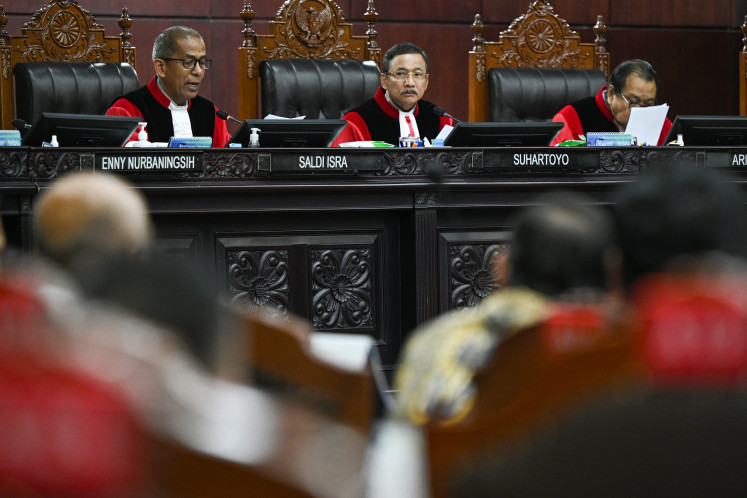Popular Reads
Top Results
Can't find what you're looking for?
View all search resultsPopular Reads
Top Results
Can't find what you're looking for?
View all search resultsForestry, mining graft costs more than resources
A recent report released by a number of NGOs grouped under the Coalition against Forestry Mafia claimed that corruption in the natural resources sector had incurred state losses to the tune of Rp 1
Change text size
Gift Premium Articles
to Anyone
A
recent report released by a number of NGOs grouped under the Coalition against Forestry Mafia claimed that corruption in the natural resources sector had incurred state losses to the tune of Rp 1.92 trillion (US$193.9 million).
The coalition, which conducted a study on graft in the forestry and mining sectors since 2012, accused law enforcers of not being serious in the fight against endemic corruption.
The Corruption Eradication Commission (KPK), it said, should investigate allegations involving 16 state and provincial officials, as well as companies in three resource-rich provinces, West Kalimantan, East Kalimantan and South Sumatra.
The study cited at least five corruption cases in the three provinces that should be investigated.
It found indications of corruption in the use of land by PTPN VII in South Sumatra with a potential loss to the state of Rp 4.84 billion.
Alleged corrupt practices ' implicating officials from the Forestry Ministry ' in permit issuance for HTI (industrial forest permits) in Merang-Kepayang, South Sumatra, and in West Kalimantan, had potential losses of Rp 1.7 trillion and Rp 51.5 billion, respectively.
The coalition also found irregularities regarding land conversion from protected forest into palm oil plantations involving regional administration officials in Kapuas Hulu, West Kalimantan, which may have cost the state Rp 108 billion.
'There is also alleged bribery regarding mining permit issuance in Samarinda, with potential state losses of Rp 4 billion,' Tama S. Langkun of the Indonesian Corruption Watch (ICW) said on Wednesday.
Tama said corruption usually occurred during the issuance of permits for forest clearing to make way for plantations and mining operations.
'The amount of money swindled in the natural resources sector is unlimited, unlike corruption involving the state budget, which stops when the budget runs out.'
Tama refused to name the companies, ministers or state officials allegedly involved in the corrupt practices. He added that the ICW would submit its findings to the KPK on Friday.
'State losses in the natural resources sector can be avoided if the government and law enforcers are serious in combating forestry-related corruption,' he said.
Meanwhile, Hadi Daryanto, Forestry Ministry secretary-general, said the ministry would investigate the findings.
'We will follow up the findings and if the allegations are true, sanctions will be imposed on those implicated,' Hadi told the Jakarta Post on Wednesday.
'As for the HTI, should we uncover any misconduct, we will annul their permits and would bring to justice those who cut trees in bordered areas,' he added.
The Forestry Ministry recently signed a memorandum of understanding (MoU) with the Corruption Eradication Commission (KPK) to prevent such malpractice.
The MoU was based on reports from the Supreme Audit Agency (BPK) filed with the National Police's Criminal Investigation Division (Bareskrim) in March. The reports claimed that 26 mining and plantation companies were involved in corruption and malfeasance.
The report, which said that the resulting state losses topped Rp 90.6 billion (US$9.3 million) in 2011, found three patterns of violations: operating in protected forests without concessions from the Forestry Ministry, running forest-clearance activities without permits and illegal logging.










